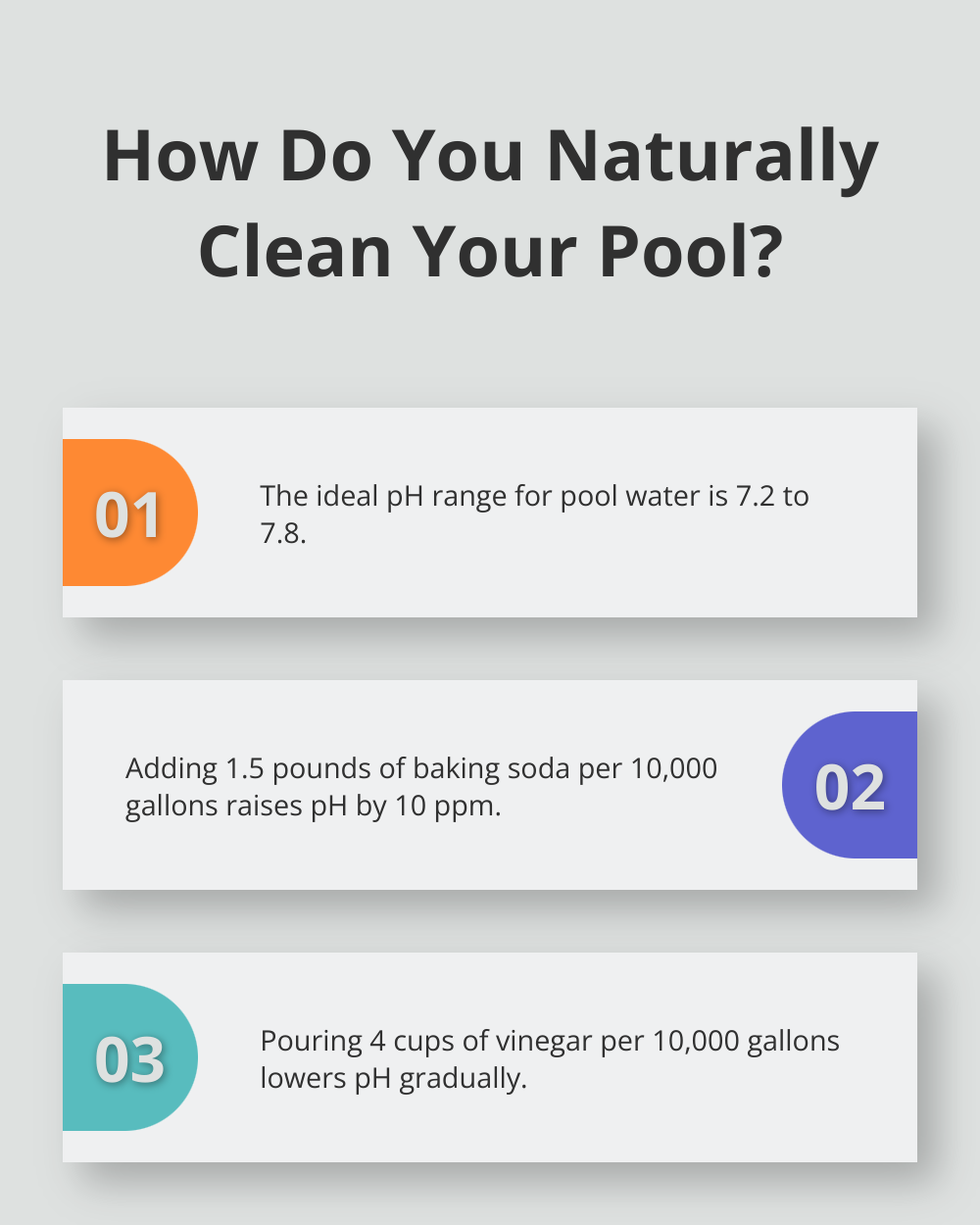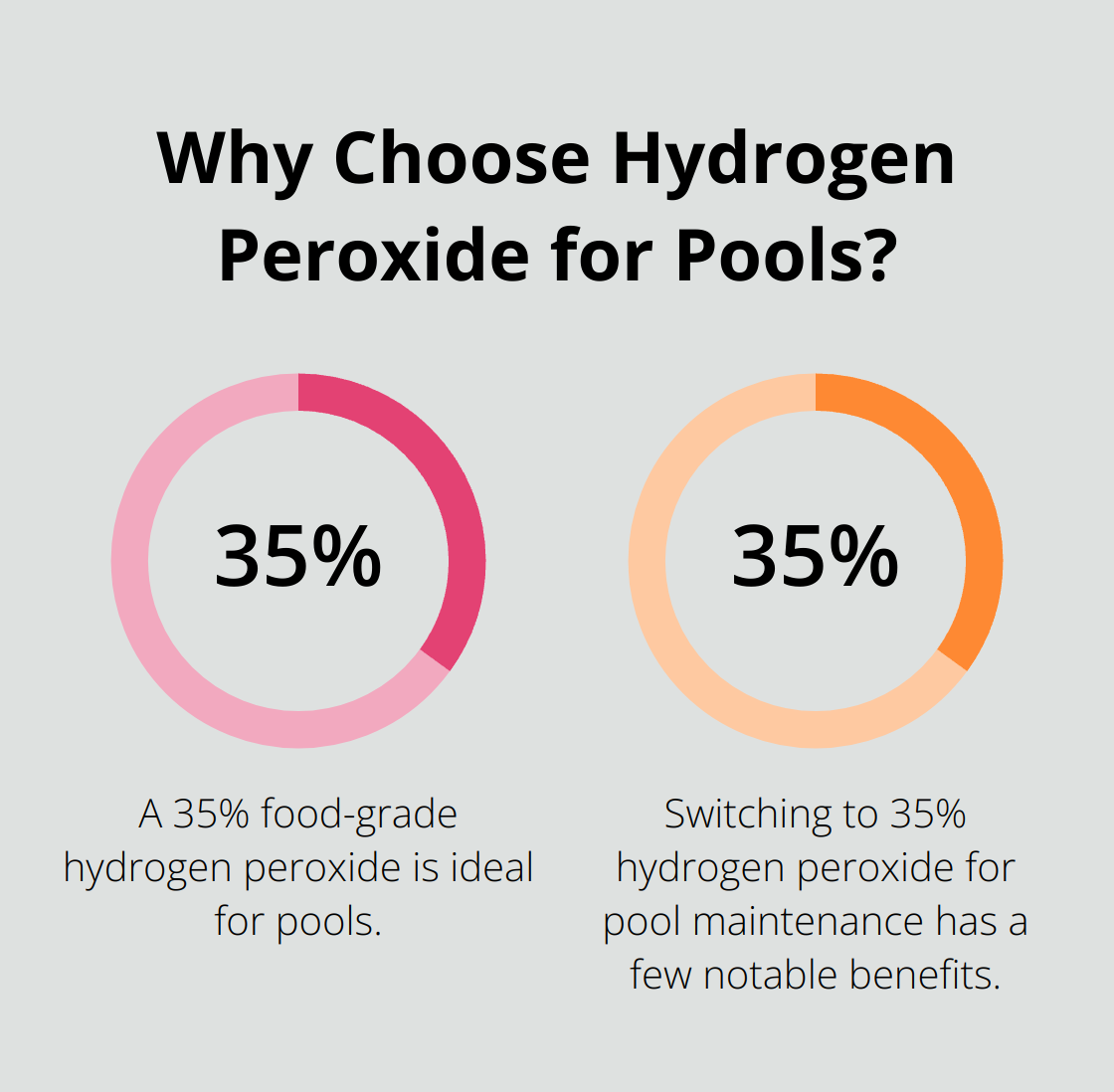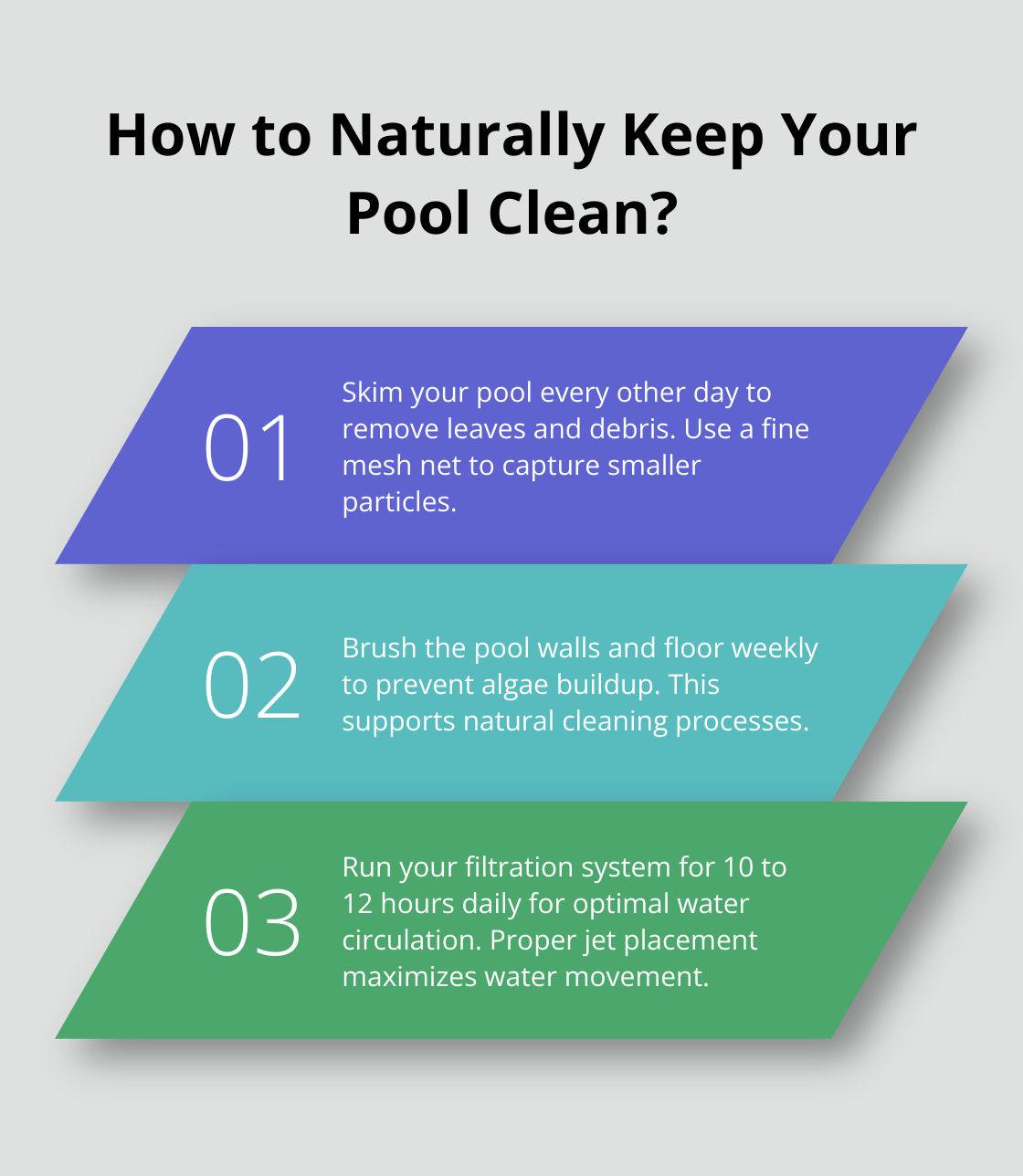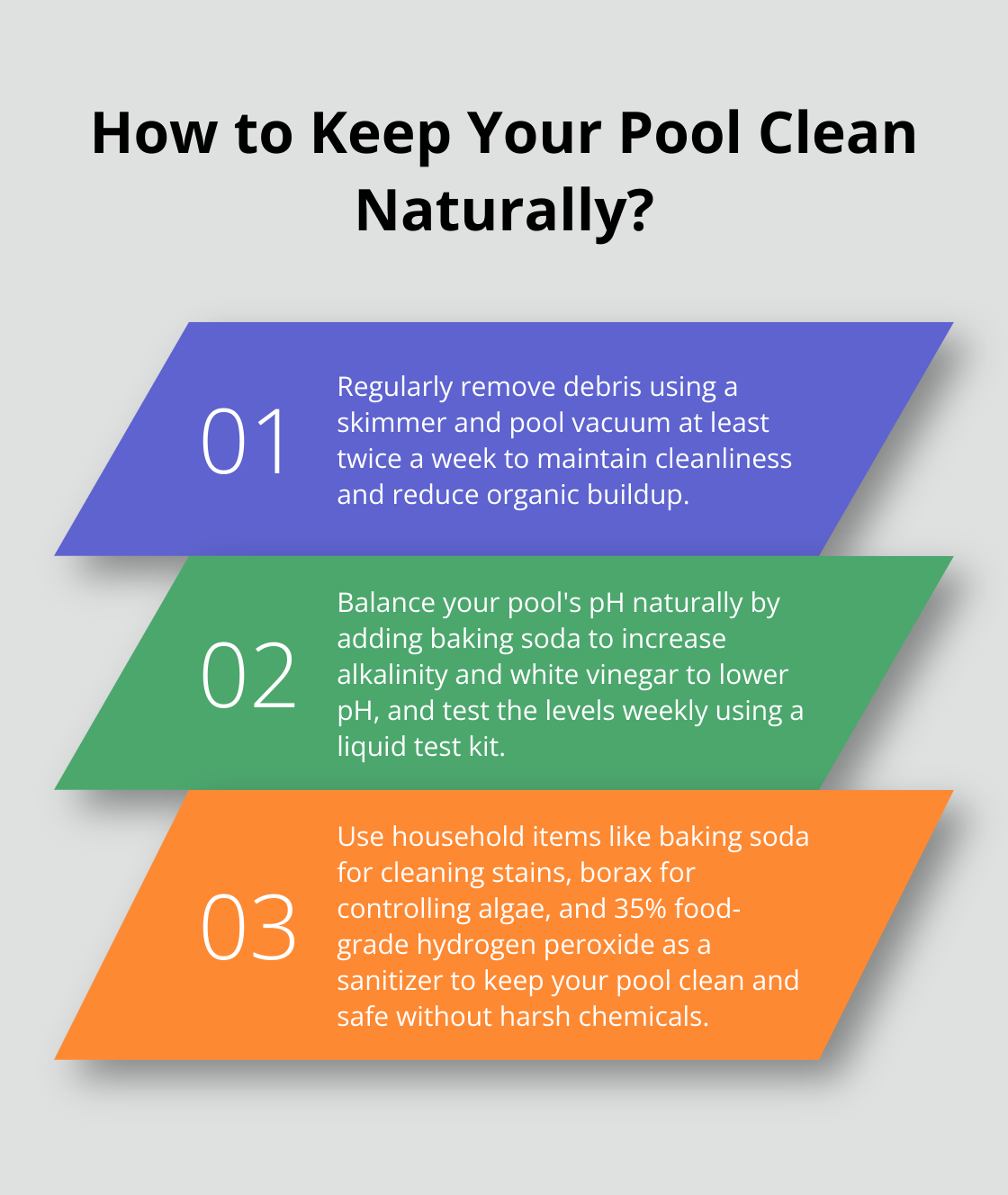Keeping your pool clean doesn’t have to mean using harsh chemicals.
There are natural methods that are effective and safe.
At The A Team Cleaning Services, we believe in practical and eco-friendly solutions.
Let’s explore how to maintain a spotless pool using natural ingredients.
How to Prepare Your Pool
Assess the Pool’s Condition
Start by checking your pool’s current state. Look at the water clarity and any visible debris. Pay attention to algae growth on the walls or floor. If your pool has a filtration system, inspect it to ensure it’s functioning correctly. In 2022, a study found that a pool-testing approach may shorten the screening time and increase the test rate during times of limited test availability and inadequate resources. Knowing exactly what you’re dealing with will help you choose the right natural cleaning methods.
Clear Away Debris
Removing debris is essential for a clean, natural pool. Use a skimmer to take out leaves, bugs, and any floating materials. For smaller debris, a fine mesh skimmer works best. A pool vacuum can handle larger debris at the bottom. Make it a routine task; do it at least twice a week. An eco-friendly way to dispose of organic matter is by composting it if applicable.
Balance pH Levels Naturally
Maintaining the right pH level is key for both swimmer safety and the effectiveness of natural cleaning processes. The ideal pH range for pool water is between 7.2 and 7.8. You can naturally balance these levels using common household items. Baking soda can increase the alkalinity of your pool water, and adding 1.5 pounds per 10,000 gallons of water can raise the pH by 10 parts per million (ppm).

For lowering pH, using white vinegar is effective. Pouring in about 4 cups of vinegar for every 10,000 gallons can help bring it down gradually. Regular pH testing, at least once a week, ensures the pool stays within the safe range. Utilize liquid test kits for the most accurate results, as they account for a wider range of parameters compared to strips.
How Can You Clean Your Pool Naturally?
Utilizing household items can help maintain a pristine pool without relying on harsh chemicals. Here are some effective methods:
Baking Soda for Cleaning and Stain Removal
Baking soda isn’t just for baking; it’s a powerful pool cleaner. For stubborn stains on your pool walls, create a paste using baking soda and water. Apply the paste directly to the stains and scrub with a brush. This method is highly effective for removing algae stains on the tiles. Additionally, baking soda helps maintain alkalinity, aiding in overall water balance. Regular cleaning sessions using baking soda will keep surfaces spotless and reduce the buildup of grime.
Borax for Algae Control
Algae can quickly take over if not controlled. Borax, commonly found in household laundry detergents, can be your go-to solution for algae. Sprinkle borax directly onto algae-affected areas and scrub with a pool brush. Borax disrupts the algae’s reproduction process without introducing toxic chemicals into your water. It’s a cost-effective and eco-friendly alternative. Studies have shown that using borax can significantly reduce algae growth in pools by removing most of the naturally occurring carbon dioxide from pool water, which doesn’t allow algae to grow and bloom as carbon dioxide is removed, making it a practical choice for regular maintenance.
Hydrogen Peroxide as a Sanitizer
Hydrogen peroxide serves as a natural sanitizer, replacing traditional chlorine. A 35% food-grade hydrogen peroxide is ideal for pools. Switching to 35% hydrogen peroxide for pool maintenance has a few notable benefits. One primary advantage is its strong oxidizing capability, which is effective. Hydrogen peroxide breaks down into oxygen and water, leaving no harmful residues behind. Regular use of hydrogen peroxide not only keeps your pool clean but also ensures a safer swimming environment for everyone. Moreover, using hydrogen peroxide can be a cost-effective alternative to constant chlorine use, bringing the focus back to natural solutions.

How to Keep Your Pool Naturally Clean
Consistent upkeep ensures your pool remains clean and inviting. Here are some practical strategies for maintaining your pool naturally.
Skim and Brush Regularly
Regular skimming and brushing play a huge role in keeping your pool clean. Skim the surface of your pool at least every other day to remove leaves, bugs, and other debris. A skimmer with a fine mesh net can help capture smaller particles, ensuring your water stays clear. Brushing the pool walls and floor once a week helps prevent algae and other build-ups. Investing in a good quality pool brush makes this task easier and more effective. Brushing also supports natural cleaning processes by dislodging dirt and debris that can then be filtered out.
Boost Circulation with Natural Methods
Efficient water circulation is vital to keeping your pool naturally clean. Most pools should run their filtration systems for about 10 to 12 hours a day. This helps to move the water through your natural filtration system, whether it’s a sand, cartridge, or diatomaceous earth filter. Enhancing circulation can also be achieved by strategically placing pool return jets to maximize water movement. Simple restructuring of your pool jet positioning ensures better distribution of treated water, thus improving overall cleanliness.
Harness the Power of Plants and Enzymes
Incorporating plants and natural enzymes into your pool maintenance routine can significantly improve water quality. Plants, especially those in natural swimming pools, play essential roles in maintaining a clean ecosystem. Floating plants such as water lilies, submerged plants like pondweed, and emergent plants like cattails work synergistically to filter the water. They absorb nutrients that algae feed on, thereby reducing algae growth.

Natural enzymes break down organic matter such as body oils, lotions, and plant debris. Enzyme-based pool cleaners are available, and when used regularly, they can manage the organic load in your pool. This reduces the need for manual cleaning and chemical additives. For instance, adding enzymes weekly can clear up cloudy water and minimize unpleasant odors, making your pool more enjoyable.
By following these steps, you maintain a clean and healthy pool environment using natural methods.
Conclusion
Embracing natural methods for pool cleaning offers numerous benefits. By using eco-friendly alternatives, you create a healthier swimming environment and reduce the reliance on harsh chemicals. Clean water, improved safety, and a lower environmental footprint are significant advantages that come with these natural approaches.

Throughout this guide, we’ve covered essential methods like using baking soda for cleaning and stain removal, borax for algae control, and hydrogen peroxide as a sanitizer. Regular skimming and brushing, boosting circulation, and incorporating plants and enzymes play pivotal roles in maintaining a clear and inviting pool.
Adopting these natural pool cleaning strategies not only promotes sustainability but also leads to a more enjoyable swimming experience.
For comprehensive assistance, visit The A Team Cleaning Services. We are dedicated to providing exceptional cleaning solutions for your home or business, ensuring a spotless and fresh-smelling environment that you’ll love.
